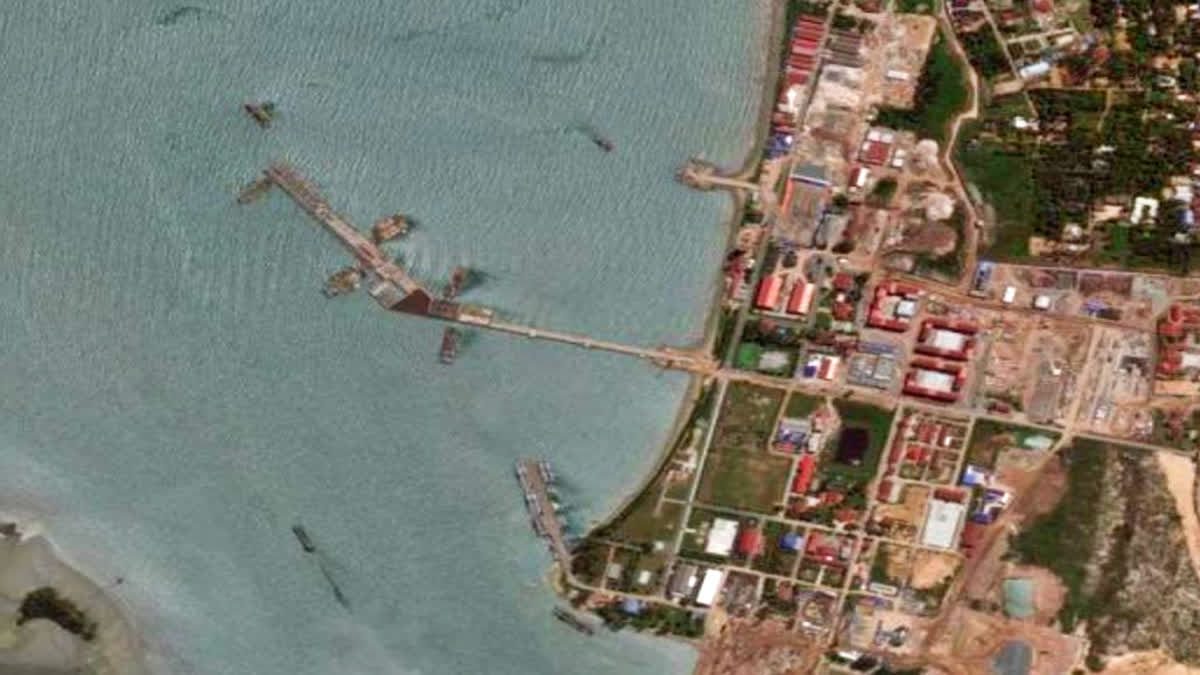New Delhi: With reports suggesting that renovation work of a naval base in Cambodia with China’s help nearing completion, India will be concerned as it will have implications for the security in the Indo-Pacific region.
Satellite images show that during the course of the renovation work at the Ream naval base operated by the Royal Cambodian Navy, a major pier has been constructed at the site that is capable of anchoring aircraft carriers. The base is located on the coast of the Gulf of Thailand in the province of Sihanoukville, Cambodia. The base, which covers approximately 190 acres, is located on a peninsula just southeast of the provincial capital, Krong Preah Sihanouk.
American officials have already voiced suspicions that this naval base will be used by the Chinese military. If true, this will be the second overseas Chinese overseas naval base after the one in Djibouti in the Horn of Africa. If the base becomes operational, it will raise concerns in New Delhi as well. India is part of the Quad, which also includes Australia, Japan and the US, that is working for a free and open Indo-Pacific in the face of Chinese hegemony in the region.
According to K. Yhome, Senior Fellow in the Shillong-based think tank Asian Confluence, the naval base in Djibouti was primarily started for anti-piracy operations. But, if the reports about the Ream naval base are true, then ti will definitely be a cause of concern for India, he said.
“China is basically looking for alternative land routes because of its disputes in the South China Sea and its concerns over security in the Malacca Strait,” Yhome, who specialises in the Indo-Pacific region, said. “The naval base in Ream may serve both economic and military interests of China.”
Also read: China’s military training of African officers and India’s counterbalancing
China has territorial disputes in the South China Sea with several of the 10 member states of the Association of Southeast Asian Nations (ASEAN), a bloc with which India maintains close relations under New Delhi’s extended neighbourhood policy. China is also jittery about what former Chinese President Hu Jintao described as the "Malacca Dilemma". The Malacca Strait is a narrow stretch of water between Malaysia and the Indonesian island of Sumatra and serves as a crucial link to the South China Sea. The Chinese are worried that the strait, which is effectively under the US control, can be choked any time if trouble arises, cutting down energy supplies from the Middle East and Africa.
Yhome said that the development in the Ream naval base will not be good news for India primarily for two reasons.
“The fact that an ASEAN member state is giving territorial space to China will be a cause of concern for New Delhi. Secondly, from the military-security perspective, the Ream naval base will bring China strategically close to India,” he said.
China has also invested heavily in the Hambantota port in Sri Lanka and the Gwadar port in Pakistan. Work in the Hambantota port got disrupted as Sri Lanka found itself in a debt trap and also because of political instability in that country. The Gwadar port in Pakistan is being built as part of Chinese President Xi Jinping’s pet Belt and Road Initiative (BRI). The port is a cause of concern for India as it is connected by the China-Pakistan Economic Corridor that passes through Pakistan-occupied Kashmir.
India and Cambodia have traditionally shared warm and cordial bilateral relations. In May this year, King of Cambodia Preah Bat Samdech Preah Boromneath Norodom Sihamoni paid a bilateral visit to India. However, it will be interesting to see how New Delhi will react if reports about China’s interests in the Ream naval base turn out to be true.



